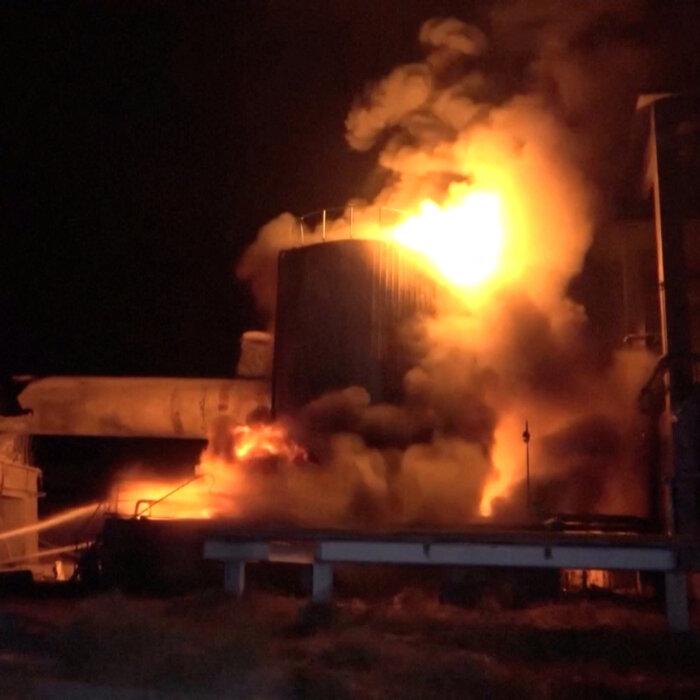Israeli Prime Minister Benjamin Netanyahu said on May 13 that there was “no way” Israel would halt its war in the Gaza Strip, even if a deal is reached to release more hostages.
In a statement released by the prime minister’s office, Netanyahu said Israeli forces were about to step up the assault and would enter Gaza, “with great strength to complete the mission. ... It means destroying Hamas.”
Netanyahu said any cease-fire deal with Hamas would only be temporary.
“We can make a cease-fire for a certain period of time, but we’re going to the end,” he said.
Netanyahu said that if Hamas released more hostages, “we’ll take them, and then we’ll go in.”
But there will be no way we will stop the war,” he said.
Netanyahu’s comments came a few hours before Israeli air strikes began in northern Gaza.
The Indonesian Hospital in Jabaliya, northern Gaza—which was built by the government of Indonesia in 2016—said 48 people were killed, including 22 children, overnight.
Alexander, who had been serving in the Israeli military, was released before U.S. President Donald Trump left for a visit to Saudi Arabia and Qatar.
Israel is not on his itinerary.
“This was a step taken in good faith towards the United States and the efforts of the mediators—Qatar and Egypt—to put an end to this very brutal war and return ALL living hostages and remains to their loved ones.
“Hopefully, this is the first of those final steps necessary to end this brutal conflict. I look very much forward to that day of celebration!”
Israel says Hamas is still holding 58 hostages, although only 23 of them are believed to be alive.
Alexander’s parents urged Netanyahu to listen to what they called “the vast majority of the Israeli public” and prioritize the release of the remaining hostages.
They thanked Trump and his envoys for “their tireless efforts on Edan’s behalf.”
During a meeting in Tel Aviv, Israel, with the families of the hostages on May 13, U.S. special envoy for the Middle East Steve Witkoff and Trump administration envoy for hostage affairs Adam Boehler said they would do whatever was needed to bring the remaining hostages home.
The conflict in Gaza began on Oct. 7, 2023, when Hamas terrorists crossed the border into Israel, killing 1,200 people and taking about 250 hostages back into the strip of territory they controlled.
Israel responded with air strikes and a ground offensive that the Hamas-controlled health ministry in Gaza claims has killed at least 52,800 Palestinians, many of them women and children. Israel has always maintained that compared with many other armed conflicts, civilian casualties are low, despite Hamas fighters using the Palestinian civilian population as human shields.
A temporary cease-fire began on Jan. 19 but ended on March 18, when the Israeli Defense Forces (IDF) resumed air strikes after talks to extend the truce stalled.
On March 19, Israel resumed a ground offensive and stated that it aimed to retake the Netzarim Corridor, which stretches just south of Gaza City and bisects the Gaza Strip into northern and southern regions.
Hamas rejected an Israeli offer of a partial cease-fire on April 17 and has stated that it would only release the remaining hostages in return for more Palestinian prisoners, a lasting cease-fire, and a full withdrawal of Israeli troops from Gaza.
Shortly before the cease-fire ended in March, Israel blocked all imports from entering the Gaza Strip.
U.N. Under-Secretary-General for Humanitarian Affairs Tom Fletcher on May 13 told the U.N. Security Council that no food, medicine, or water had entered the Gaza Strip for more than 10 weeks.
He said, “We can save hundreds of thousands of survivors. We have rigorous mechanisms to ensure our aid gets to civilians and not to Hamas, but Israel denies us access, placing the objective of depopulating Gaza before the lives of civilians.”
At the end of April, the U.N. World Food Programme stated that it had run out of food stocks in Gaza, and Trump said he had urged Netanyahu to allow food and medicine to be delivered.
During a visit to wounded soldiers on May 12, Netanyahu said, “We have put together an administration that will allow them to leave, but the problem with us is one thing—we need receptive countries.
“That’s what we’re working on right now. If you give them the go-ahead, I tell you that more than 50 percent will leave, and I think much more.”







